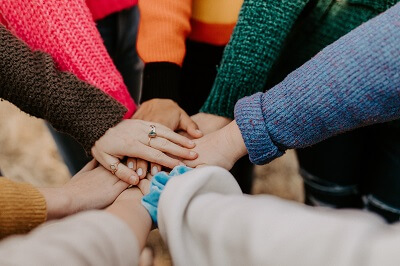A heads-up is when someone lets you know about something that’s coming up, like an appointment or meeting. If someone thanks you for giving them a heads-up, they’re saying they appreciated your warning and are happy to be prepared for whatever it is.

If the heads-up was about an event that hasn’t happened yet, say something like this: “I’m glad I could let you know what was coming up! I hope it all goes smoothly.” If the event already happened, reply: “You’re welcome.”
It’s My Pleasure
If the person who let you know is a colleague or friend, it might be more appropriate to use a casual phrase such as “my pleasure”, “no problem” or even just “no worries.” On the other hand, if you’re responding to an email from your boss or another professional contact, a simple “I don’t mind” will probably do just fine.
Remember that this is still an informal situation-you’re not writing an essay for school here!
You might also want to make smiley faces and exclamation points when appropriate (i.e. if someone says thanks for giving them the heads up).
Of Course
You can use “of course” to respond to thanks for doing something. You can also use it when you don’t want to be thanked for something or when someone asks if you have done something.
For example:
“Thanks for the heads-up on that presentation.”
“Of course.”
“Did you remember to pick up my dry cleaning?”
“Of course.”
If someone thanks you, but you don’t think what they are thanking you for was a big deal (e.g., they ask if a friend was supposed to pick up their dry cleaning), then say “of course” as a way of saying “sure” or “yes.”
No Biggie
This is the ideal response to “thanks for the heads up” because it’s so simple and casual. It’s also easy to shut down any potential awkwardness because even though someone just told you that they appreciate something that you did, there’s no need to overthink what you said or make a big deal out of it.
You can say “No problem” or “Don’t worry about it,” and then leave it at that!
It doesn’t matter if someone said thank you or not-you’re always welcome to take credit for being a good person who cares about others!
I Hope It Helps
You can reply by saying, “I hope it helps.” This is a good way to answer “thanks for the heads up” when you have helped someone in any way. It also helps with making sure that they feel appreciated and cared for.
In addition to replying with these phrases, you can also ask how they like what they received/experienced/had done.
This shows that your main focus is on them and not yourself, making them feel even more loved and cared for than if you were only focusing on yourself.
In other words, you don’t want an answer like this: “Thanks” or “Whatever” because it doesn’t show appreciation.
Please Don’t Say It
You don’t have to say it, but if you’re feeling generous, you can express your gratitude and appreciation with a simple “Thanks.”
It’s true that when someone does something nice for you, they expect to be thanked; however, it’s also important not to thank them too much. If someone helps you carry groceries or gives directions in town and then you thank them repeatedly throughout the day-it could make them feel awkward and uncomfortable.
A good rule of thumb: Unless something exceptional has happened (they saved your life), keep your gratitude at a maximum twice a day.
No Worries
When someone says thanks for the heads-up, responding with “no worries” is a good idea. This shows that you are happy to help them and not bothered by their gratitude.
The phrase is also useful when someone asks if they can pick up where you left off on a project or task at work, as it indicates that your input is appreciated and helpful.
When someone thanks you while they’re walking away from you (e.g., “Thanks again!”), this isn’t quite as strong of a signal that they want your input right now-but even so, it’s still worth responding with something like “No problem” or “No worries.”
It’s My Honor
You’ve just heard that you’re being thanked for helping someone out, and now it’s time to reply.
You can use the phrases:
“It was my honor.”
“I’m glad I could help.”
The first is a bit more formal than the second option, but both are fine choices. How you choose between them will depend on how much time you have before saying something else and how close your relationship is with the person.
Anything for You
“Anything for you” is the most common reply, and it’s used in almost every situation. It shows that you are willing to help your friend or colleague, even if it requires extra time and effort.
Another option is “no worries”. You can use this phrase when someone says, “I hope this isn’t too much work for you.”
The point behind using the word “worry” in this phrase is to reassure them that even if things do get difficult for them at some point, then they won’t need to worry about anything because all of the problems will go away as soon as possible due to your help (or lack thereof).
No Problem
No problem is a simple way of saying “thank you” without being formal. It’s most commonly used as a response to thanks for doing something but can also be used as an acknowledgment of any help or advice.
If someone says: “Thanks for the heads-up on that issue.” You can respond with: “No problem!”
Final Thoughts
If someone thanks you for a heads-up, the most important thing to remember is to respond with a simple “you’re welcome.”
This way, they know you’re happy to help and feel appreciated. They might also say “no problem,” but there’s no need to reply with another “no problem” because that would be redundant.
You can smile or nod your head in response instead!

Sophie Hammond is a journalist, psychologist, and freelance speechwriter for people in politics and business. She lives on the edge of the Rocky Mountains with her dog and a lifetime supply of books. When she’s not writing, she can be found wandering through nature or journaling at a coffee shop.

